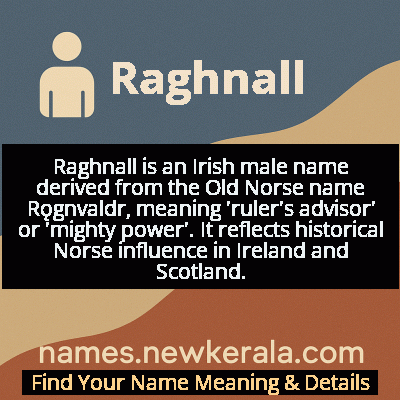Raghnall Name Meaning & Details
Origin, Popularity, Numerology Analysis & Name Meaning of Raghnall
Discover the origin, meaning, and cultural significance of the name RAGHNALL. Delve into its historical roots and explore the lasting impact it has had on communities and traditions.
Name
Raghnall
Gender
Male
Origin
Irish
Lucky Number
1
Meaning of the Name - Raghnall
Raghnall is an Irish male name derived from the Old Norse name Rǫgnvaldr, meaning 'ruler's advisor' or 'mighty power'. It reflects historical Norse influence in Ireland and Scotland.
Raghnall - Complete Numerology Analysis
Your Numerology Number
Based on Pythagorean Numerology System
Ruling Planet
Sun
Positive Nature
Leaders, ambitious, highly driven, self-reliant, innovative.
Negative Traits
Overly aggressive, domineering, impatient, selfish.
Lucky Colours
Red, orange, gold.
Lucky Days
Sunday.
Lucky Stones
Ruby, garnet.
Harmony Numbers
2, 3, 9.
Best Suited Professions
Entrepreneurs, managers, engineers.
What People Like About You
Courage, determination, leadership.
Famous People Named Raghnall
Raghnall Allister
Gaelic chieftain
Lord of Knapdale who fought to maintain Gaelic independence against Norman expansion
Raghnall mac Somhairle
Norse-Gaelic ruler
Co-ruler of the Kingdom of the Isles and founder of the MacRuari clan
Raghnall Óg
Irish poet
Notable bard in the Irish tradition who composed poems celebrating Gaelic culture
Raghnall Dubh
Clan leader
Influential figure in Scottish Highlands known for his military leadership
Name Variations & International Equivalents
Click on blue names to explore their detailed meanings. Gray names with will be available soon.
Cultural & Historical Significance
The name symbolizes the cultural synthesis that characterized much of medieval Irish history, where Norse settlers adopted Gaelic language and customs while maintaining distinct identities. In Irish mythology and historical records, figures named Raghnall frequently appear as powerful leaders who defended Gaelic territories against external threats while preserving traditional Irish social structures. This cultural significance extends to modern times, where the name serves as a living connection to Ireland's complex historical tapestry and the enduring legacy of Norse-Gaelic communities that left an indelible mark on Irish culture, language, and genealogy.
Extended Personality Analysis
Individuals named Raghnall are typically perceived as possessing strong leadership qualities, natural authority, and strategic thinking abilities. They often exhibit the characteristics of ancient chieftains—decisive, protective of their community, and capable of making difficult decisions under pressure. The name carries connotations of reliability and strength, suggesting someone who others naturally look to for guidance and support. Raghnalls are often described as having a commanding presence combined with practical wisdom, reflecting the name's meaning of 'strong ruler.'
These individuals tend to be ambitious yet grounded, with a strong sense of responsibility toward family and tradition. Modern bearers of the name often display these inherited traits through careers in leadership positions, whether in business, community organizing, or creative fields where strategic vision is valued. The historical weight of the name seems to instill a sense of purpose and connection to heritage in those who carry it, often making them particularly interested in history, culture, and preserving traditions while adapting to contemporary challenges. While each individual is unique, the name Raghnall consistently suggests someone with depth of character, resilience in facing obstacles, and the ability to inspire confidence in others through their composed and determined nature.
Modern Usage & Popularity
In contemporary times, Raghnall remains a relatively rare but culturally significant name, primarily used in Ireland and among the Irish diaspora. While not appearing on mainstream popularity charts, it has experienced a modest revival as part of the broader movement toward traditional Gaelic names. The name is particularly favored by families with strong connections to Irish heritage or those interested in Norse-Gaelic history. In recent years, Raghnall has seen increased usage in cultural hubs like Dublin, Galway, and Belfast, as well as among Irish communities in North America and Australia. Modern parents choosing this name often appreciate its historical depth and distinctive sound compared to more common Irish names. The name's rarity makes it stand out while maintaining authentic cultural roots. Current naming trends show that Raghnall is typically given to boys in families that value linguistic and historical authenticity, often as an alternative to the anglicized 'Ronald' while preserving the name's powerful meaning and heritage. Its usage reflects a growing appreciation for Ireland's complex cultural history and the revival of traditional naming practices among younger generations.
Symbolic & Spiritual Meanings
Symbolically, Raghnall represents strength, leadership, and cultural endurance. The name embodies the concept of 'ríoghnacht' (royalty or sovereignty) in Irish tradition, suggesting not just political power but the responsibility that comes with leadership. Metaphorically, it connects to themes of cultural preservation and adaptation, reflecting the historical reality of Norse-Gaelic communities that maintained their identity while integrating into broader Irish society. The name symbolizes the bridge between warrior strength and wise governance, representing the ideal of the ruler who protects through both physical might and strategic intelligence. In a broader sense, Raghnall represents the resilience of Gaelic culture through centuries of change and challenge. The name carries the symbolic weight of ancestral legacy and the continuity of tradition across generations. For modern bearers, it often serves as a reminder of the importance of cultural roots while navigating contemporary life, embodying the idea that true strength comes from understanding one's heritage and using that knowledge to build a meaningful future that honors the past while embracing progress.

